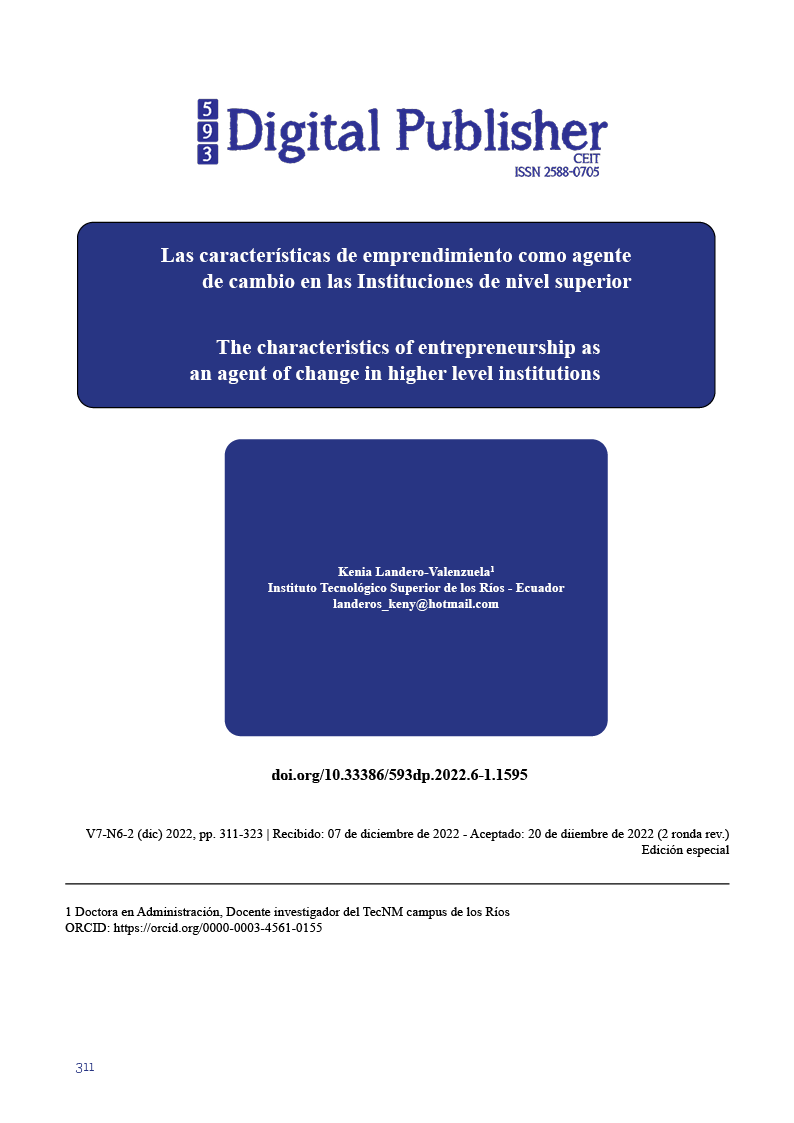Las características de emprendimiento como agente de cambio en las Instituciones de nivel superior
Contenido principal del artículo
Resumen
Muchas de las definiciones de emprender vienen acompañadas de diversas cualidades y de capacidades de una persona para eficientar y aprovechar al máximo los recursos; es por ello que el emprender lleva consigo una serie de características básicas. De acuerdo con John Kao (1989), el emprendedor es una persona con características muy particulares. La presente investigación tiene como finalidad analizar la capacidad emprendedora de los alumnos del Tecnológico Nacional de México campus de los Ríos por medio de cinco características básicas, entre ellas: creatividad, confianza en sí mismos y sus capacidades, perseverancia, capacidad para manejar problemas y aceptación al riesgo que propone Alcaraz (2011); esto con la finalidad de detectar áreas de oportunidad en los alumnos de dicha institución y que permita establecer estrategias eficientes para la formación de profesionistas capaces de emprender en cualquier plano, a su vez analizar el emprendimiento como un agente de cambio en las instituciones no sólo desde la perspectiva empresarial, el desarrollo de la investigación se realiza bajo la metodología de tipo cuantitativo, con enfoque descriptivo y diseño transversal utilizando como instrumento un cuestionario con 25 ítems analizando las características emprendedoras mencionadas con anterioridad.
Palabras clave: emprendimiento, educación, capacidades, cambio.
Descargas
Detalles del artículo

Esta obra está bajo una licencia internacional Creative Commons Atribución-NoComercial-CompartirIgual 4.0.
1. Derechos de autor
Las obras que se publican en 593 Digital Publisher CEIT están sujetas a los siguientes términos:
1.1. 593 Digital Publisher CEIT, conserva los derechos patrimoniales (copyright) de las obras publicadas, favorece y permite la reutilización de las mismas bajo la licencia Licencia Creative Commons 4.0 de Reconocimiento-NoComercial-CompartirIgual 4.0, por lo cual se pueden copiar, usar, difundir, transmitir y exponer públicamente, siempre que:
1.1.a. Se cite la autoría y fuente original de su publicación (revista, editorial, URL).
1.1.b. No se usen para fines comerciales u onerosos.
1.1.c. Se mencione la existencia y especificaciones de esta licencia de uso.
Citas
Alcaraz, R. ((2011). El emprendedor de éxito. 4th edición. México, editorial McGraw-. Hill/Interamericana Editores, S.A. de C.V.
Acs, Z. J., Desai, S., & Hessels J. (2008). Entrepreneurship, economic development and institutions. Small Business Economics, 31, 219‐234.
Calvo, C. (2004). Emprendedores Expansión. Recuperado de: http://www.tress.com.mx/boletín/diciembre2004/articulo4.htm.Estrada, E. R. R. (2016).
Censo de Población y Vivienda (2020). Panorama sociodemográfico de Tabasco: Censo de Población y Vivienda 2020 : CPV / Instituto Nacional de Estadística y Geografía. México INEGI, 2021.
Connelly, B. L., Ireland, R. D., Reutzel, C. R., & Coombs, J. E. (2010). The power and effects of entrepreneurship research. Entrepreneurship: Theory and Practice, 34, 1, 131‐149.
Gartner, W. (1985). A conceptual framework for describing the phenomena of venture creation. Academy of Management Review, 10 (4), 696-706.
Gartner, W. (1988). Who is an entrepreneur is the wrong question. American Small Business, 13, 11-31.
Gibb, A. & Ritchie, J. (1981a). The Shell Entrepreneurs: Part.1, Entrepreuralism as a Social Process; Part.2, Understanding the star up process; Part.3, The Shell Competition and its impact. Durham: Durham University Business School.
Gibb, A. & Ritchie, J. (1981b). Influences on entrepreneurship: Study over time. U.K., Small Business Research Conferenc. London.
Hernández, R., Fernández, C., & Baptista, P. (2014). Metodología de la investigación 6ta. Edición. México D.F. editorial McGraw-Hill.
Ishida, M., Kantis H., Komori, M. (March, 2002). Entrepreneurships in emerging economies: The Creation and Development of New Firms in Latin America and East Asia. Inter-American Development Bank. pp. 1-131INEC. (2012).
Instituto Técnologico Superior de los Ríos (2022). Matrícula otorgada por el departamento de servicios escolares.
Landero, K. (2011). Diagnostico de los recursos y capacidades del Instituto Tecnológico Superior de los Ríos para transferir un modelo de incubación de empresas [Tesis de maestría, Universidad Autónoma de Tabasco].
Lerner, J. (2010). The future of public efforts to boost entrepreneurship and venture capital. Small Business Economics, 35, 255‐264.
Meyer, G. D. (2011). The reinvention of academic entrepreneurship. Journal of Small Business Management, 49, 1, 1‐8.
Muñozcano, J. (2006). ¿Tienes una idea?: El valor de las ideas: ¿cómo sé si soy emprendedor? Emprendedores. Recuperado de: http://www.esmas.com/emprendedores/ideasenpapel/eresemprendedor/493297.html.
Stokes, D., Wilson, N., & Mador, M. (2010). Entrepreneurship. Hampshire, UK: Cengage Learning EMEA.
Villaseñor (1988) De los Emprendedores Su Universo de Acción


